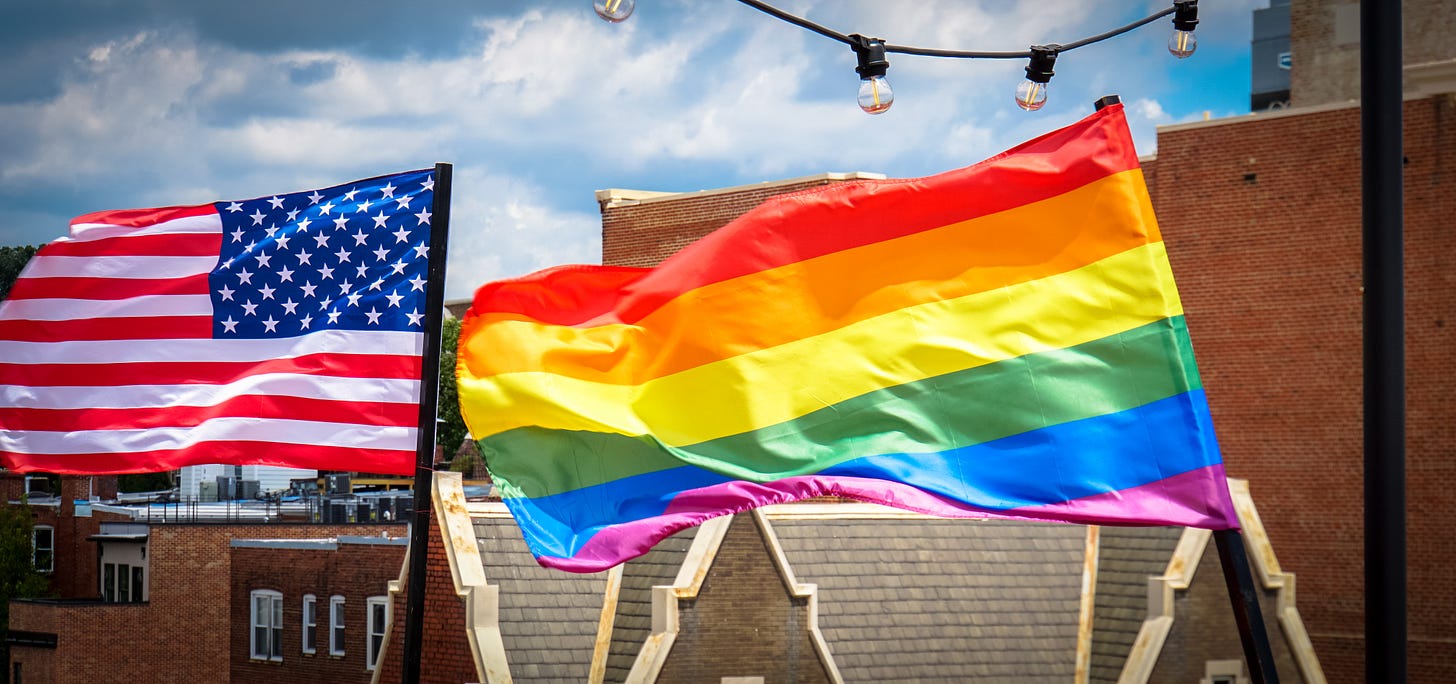Mar. 5, 2024 ❧ CDC says go to work with COVID, a Starbucks union breakthrough, and period poverty
Plus: Tennessee bans Pride flags, Trump babbles even more inanely than usual, the Pentagon Leaker is sentenced, Brazil proposes a global wealth tax, and centipedes deceive the people
Newsworthiness is next to godliness
STORIES THAT SHOULD BE BIGGER
JUST GO TO WORK SICK, SAYS CDC
In a shocking and dangerous announcement on March 1, the Centers for Disease Control and Prevention said that people who test positive for COVID-19 no longer need to self-isolate for 5 days, as they had previously recommended. Instead, the agency now says people can “go back to [their] normal activities” as long as their “symptoms are getting better overall,” and they “have not had a fever” for at least 24 hours. In other words, the CDC is explicitly saying that it’s okay for people who are still sick to go in and work their usual shifts.
To put it mildly, this is disturbing news. In its summary of the new guidelines, the CDC claims that COVID “is no longer the emergency that it once was,” and that its “health impacts increasingly resemble those of other respiratory viral illnesses, including influenza.” But neither of those statements is exactly true. As we reported in the News Briefing last month, January 2024 saw a significant surge in COVID numbers, especially cases of the JN.1 variant. Despite President Biden’s boasts to the contrary, the pandemic never actually ended. And in terms of “health impacts,” it would be more accurate to say that they aren’t fully understood. There’s some evidence that COVID-19 literally causes brain cells to fuse together, leading to cognitive damage of unknown extent. In its own materials, the Cleveland Clinic emphasizes that COVID infection can lead to a higher risk of heart attack, “even in people who have mild cases.” It’s nasty stuff, and certainly not just an ordinary case of the flu. Meanwhile, the CDC’s other rationale for the change in guidelines—that we now have “more and better tools and protection” against COVID, like vaccines and paxlovid—makes even less sense. That’s like saying we have burn gel and bandages, so it’s okay to slap your hand down on a hot frying pan.

Instead, it’s pretty obvious that this decision is all about getting people back to work quicker, increasing productivity, and boosting corporate profits—along with the perceived success of “Bidenomics” in an election year. It’s worth remembering that the CDC has sold out the U.S. working class before. At one point, their guidelines for COVID isolation stated 10 days as the appropriate number—but then the airline industry pressured them to reduce it to 5, citing concerns about “labor shortages,” and they obeyed. This is another step down the same road, and it will almost certainly get people killed.
We need an entirely different kind of leadership, oriented toward the needs of ordinary workers and citizens, not corporations and political parties. In the meantime, people who test positive for COVID need to resist any effort to bring them into the workplace while they’re still sick, and their co-workers who aren’t sick need to support them in that. If there’s a mass refusal to go along with this agenda, it can’t be carried out. Walk off the job, or go on strike over it, if you have to. It’s that serious.

FIGHTING BACK
MAJOR GAINS FOR STARBUCKS UNION
In happier news, the Starbucks Workers United (SWU) labor union has scored an important victory—both for themselves and for the U.S. labor movement as a whole. In a surprise announcement last week, the SWU said that Starbucks had finally agreed to come to the bargaining table, and to “begin discussions on a foundational framework to achieve collective bargaining agreements for represented stores and partners.” Translated from legalese, this means that the company has agreed—at least in principle—to negotiate a single contract that covers every store that’s joined the SWU so far. According to the interactive map at More Perfect Union, that number is currently 392 stores in 43 states. (And it’s growing all the time, with another 20 stores filing to unionize at the end of February.)
It’s hard to overstate how much of a sea change this is. As Alex Press writes for Jacobin, Starbucks’ corporate leadership has “waged a scorched-earth campaign against its employees” up to this point, pulling every dirty trick in the book to prevent organizing. The company has abruptly closed popular stores after a union vote, threatened to take away transgender healthcare from workers who join the SWU, hired at least 110 lawyers from the notorious union-busting Littler Mendelson firm, and even sued the SWU for trademark infringement over its name and logo. And none of it worked. Although it won’t openly say so, the company has realized that it can’t break the union, and will have to negotiate. The workers stood strong, and they won.
In turn, this means that the organizing model Starbucks Workers United have pursued works—and that it can probably be replicated at other fast-food chains. In another Jacobin article, Eric Blanc explains several of the innovative tactics the SWU brought to bear, including the use of social media to publicize organizing efforts, an emphasis on “worker-to-worker” organizing that doesn’t require paid union staff and the tried-and-true method of “salting” workplaces with organizers who take jobs solely for the purpose of starting a union drive. These tactics need to be deployed at restaurants like McDonald’s, which has resisted unionization for decades, and Wendy’s, which recently committed a horrific string of child labor violations. Workers in the fast-food industry have been forced to put up with low pay and unsafe conditions for too long, but they’re finally realizing the power they have as a class, and learning how to wield it. The fight will be long and difficult, but victory is in sight.

CROOKS vs. SICKOS (or, “What’s going on with our politicians?”)
❧ Donald Trump said some really weird things in the past week, even for him. Last Thursday, the ex-president went on one of his trademark anti-immigrant rants, but with a twist: he claimed that the United States was being infiltrated by people “from countries unknown, who don’t speak languages.” “We have languages coming into our country, we have nobody who even speaks those languages,” Trump said, adding that “they’re truly foreign languages.” It’s unclear what he was talking about, since the largest group of immigrants to the U.S. (42 percent) speaks some variety of Spanish, followed by other easily recognizable languages like French, Chinese, Arabic, and so on. The concept of a “truly foreign language” that nobody speaks is currently unknown to the field of linguistics. (Somebody get Noam Chomsky on the red phone!) Trump has always rambled on about vaguely racist nonsense, but if anything, he seems to be getting more incoherent.
To make matters worse, Trump had another bizarre incident on Saturday, in which he seemed to think Barack Obama is still President. “Putin has so little respect for Obama that he’s starting to throw around the nuclear word,” he said during a campaign event in Richmond, Virginia. As Nina Lakhani notes for the Guardian, this is a mistake he’s made at least twice before, including at a 2023 event where he claimed Hungarian Prime Minister Viktor Orbán was calling on “Obama” to resign. (Trump also called Orbán the “leader of Turkey” in a previous blunder.) Recently, the question of Joe Biden’s mental fitness—or lack thereof—has been discussed a lot, and for good reason: it’s alarming when the sitting President keeps talking to the ghost of Mitterand. But Trump doesn’t really seem to be doing much better. When both of the major candidates to lead the country are extremely old men who appear to have a shaky grip on reality—and when any path to replace them is firmly blocked—it’s hard to avoid the feeling that the U.S. is exuding “failed state” energy.

❧ The Biden Justice Department asked the Foreign Intelligence Surveillance Court to extend its warrantless spying authorities for another year without consulting Congress. Under Section 702 of the Foreign Intelligence Surveillance Act, passed in the wake of 9/11, the government is allowed to collect the communications data of non-Americans outside the US. According to the Brennan Center for Justice, intelligence agencies conduct more than 200,000 warrantless searches of Americans’ private communications every year. Brennan’s Noah Chauvin and Elizabeth Goitein write:
Intelligence officials are only supposed to perform these searches if they reasonably believe they are likely to uncover foreign intelligence, or, in the case of the FBI, evidence of a crime. It’s an extremely permissive rule, yet agencies have repeatedly violated it. Declassified documents have revealed that officials have performed baseless backdoor searches for the private communications of racial justice protesters, members of Congress, journalists, crime victims, and political donors, among many others.
Members of both parties have expressed the desire to reform Section 702 of FISA. But reform negotiations last month stalled out, and the Biden administration decided to press ahead anyway, seeking to renew the power without Congress’ approval.
One of the bill’s sponsors, Senator Ron Wyden (D-OR) called it “utterly ridiculous that the Biden administration and the Justice Department would rather risk the long-term future of an important surveillance authority than support a single meaningful reform to protect Americans' rights.”
AROUND THE STATES
❧ The state of Tennessee has advanced a bill which would effectively ban LGBTQ Pride flags in schools. Called HB 1605, the bill would prohibit public schools (and some charters) from displaying “flags other than the official United States flag and the official Tennessee state flag,” along with a few others like the POW/MIA flag (which has distinctly right-wing origins) and those of recognized Native American tribes.
Although the rainbow Pride flag isn’t mentioned by name, it would definitely fall in the forbidden category—and Tennessee lawmakers haven’t been shy about saying so. State Representative Gino Bulso, the new bill’s sponsor, says he decided to draft the legislation after hearing complaints that “certain teachers and counselors were displaying a pride flag” in his district, and he insists that “parents have the right to instill values in their own children that they agree with.” But nobody—parent or otherwise—has the right to “instill” homophobia. What’s more, the concept of banning pro-LGBTQ flags would be an obvious infringement on the constitutional right to free speech and expression—especially since, as Tennessee Senator Randy McNally has pointed out, exceptions are made for other kinds of flags.
In fact, it would be hard to think of a more clear-cut First Amendment case. According to The Hill, the Senate version of Bulso’s hateful bill is also expected to pass, but if he has any sense, Tennessee Governor Bill Lee won’t sign it. If he does, any judge who’s not a partisan hack would immediately throw it out.

❧ Massachusetts Air National Guardsman Jack Teixeira, arrested last year for posting military secrets, including about the war in Ukraine, on Discord, has pled guilty to six violations of the Espionage Act. The 22-year-old Pentagon Leaker now faces at least 11 years in prison and potentially up to 16 in what is one of the longest sentences ever imposed for leaking classified information.
Unlike other whistleblowers, who went to the press with leaked evidence of grave wrongdoing, Teixeira seemed primarily concerned with impressing his gamer friends. But that doesn’t make the contents of his leaks any less important. In a very detailed rundown from May 2023, Chas Danner of New York Magazine laid out the most important ones. Here is some of the most important intelligence Teixeira revealed:
The United States had little hope for Ukraine’s spring 2023 counter-offensive, contradicting rosy pronouncements from the Biden administration.
The US also advised Ukraine against its failed attempt to hold the city of Bakhmut, but it went ahead anyway despite the grim assessment.
The US has been conducting surveillance on Ukrainian President Volodymyr Zelenskyy.
Russia nearly shot down a British spy plane. This could have led to a dramatic escalation of the war because the UK is part of NATO’s collective security agreement.
The US, UK, and France all have special forces on the ground in Ukraine.
Ukraine had plans to covertly attack the Russian-backed Wagner Group in Syria via Kurdish militia groups.
All of this information seems pretty critical to the public’s understanding of the war, showing its dangerous potential to spiral into a wider conflict and that Ukraine’s counteroffensives were expected to provide minimal gains. The information in these documents should give us reason to scrutinize the more than $46 billion in military support the US has given to Ukraine.
Americans have a right to know how and to what end that money is being spent. And while Teixeira himself did not reveal these things out of principle like Edward Snowden or Chelsea Manning, they are still in the public interest.
⚜ LONG READ: Macy’s is shutting down more than 150 stores and laying off more than 2,350 workers. While e-commerce giants like Amazon have had a major part in the collapse of one of America’s oldest retailers, the Labor Institute’s Les Leopold points to another culprit: stock buybacks. According to Common Dreams:
Macy's stock price has dropped 75% from its peak in 2015, pushing it to close nearly a third of its locations in less than a decade, but Les Leopold, co-founder of the Labor Institute, argued Wednesday that the company could have responded to changes in the retail market by "reinvesting to modernize and become more competitive," but didn't—"a classic story."
"Instead, they siphoned off the corporation's wealth to Wall Street stock sellers and top officers," Leopold told Common Dreams. "That virtually guaranteed that Macy's would have to close stores and layoff thousands of workers, in effect, paying for all those stock incentives."
Since October 2019, said Leopold, Macy's has "put $1 billion into stock buybacks" to elevate its shareholders' returns—about 20% of the company's current value.
Leopold—author of the new book Wall Street's War on Workers: How Mass Layoffs and Greed are Destroying the Working Class and What To Do About It—said that buybacks allow executives and investors to "legally loot a company" by "returning wealth to large Wall Street firms and top Macy's officers who received about two-thirds of the income through stock incentives."
Stock buybacks, which were considered an illegal form of stock manipulation until regulatory rollbacks under the Reagan administration, is a driver of mass layoffs like those announced by Macy's, said Leopold, noting that the Department of Labor identifies a layoff from a job as "one of the most traumatic events you can experience in life."
LABOR COMICS FROM 1919: SADLY, STILL RELEVANT

AROUND THE WORLD
❧ Ghana has introduced one of the world’s harshest anti-LGBTQ laws. The new legislation, which passed through the country’s parliament last week, includes prison sentences of up to three years for simply identifying as gay, lesbian, transgender, or really anything other than cishet. It also assigns longer sentences for various forms of LGBTQ activism, and encourages citizens to report anyone they suspect of being gay to the police for “necessary action.” This is another escalation in state-sponsored homophobia in Africa, which previously saw Uganda pass a law punishing “aggravated homosexuality” (a term with a disturbingly vague definition, which seems to include everything from rape to consensual sex between HIV-positive adults) with the death penalty. The Ghana law is somehow even more restrictive, since it doesn’t even require any sex act to be involved—just a court or a judge’s determination that any individual seems to be part of the LGBTQ community.
Obviously this law is a hideous human rights violation, and pressure needs to be put on Ghana’s President Nana Akufo-Addo to veto it. Similarly, Uganda needs to be told in no uncertain terms that its anti-gay laws are unacceptable. (This is the sort of thing foreign policy and diplomacy should be about, instead of endless war.) But it’s also important to consider the role of colonialism and imperialism in all this.
As Val Kalende wrote for the Guardian back in 2014, there’s nothing innately homophobic about Africa. Prior to European colonialism, plenty of African cultures recognized and respected same-sex relationships, or had a concept of gender that included more than just “male” and “female.” It was largely European missionaries and colonists who punished and stigmatized those identities, and created the climate of fear and hatred that persists in places like Ghana today. And the homophobic imperialism hasn’t ended, either: in Ghana itself, political lobbying from the Pentecostal church (which is not exactly indigenous to Africa!) was a big factor in getting the new law passed, and in Uganda, conservative U.S. lawmakers like Representative Tim Walberg have made special trips to endorse and promote homophobia. In this way, the anticolonial struggle and the fight for gay rights are deeply linked. Solidarity between activists in both will be an important first step in creating a more just and inclusive Africa.

❧ Pharmacies in Catalonia are addressing “period poverty” by giving out free, reusable menstrual products. According to The Guardian, the government of the semi-autonomous region in Spain began this initiative “after a survey found 44% of women using menstruation products in Catalonia could not afford their first-choice product and 23% said they had to reuse items designed for single use.” The initiative is expected to benefit 2.5 million people and result in 9,000 fewer tonnes of waste each year.
The inability to pay for essential products like tampons and pads is experienced by people around the world, but few places have made serious efforts to address it. In 2020, Scotland became the first nation to guarantee tampons and sanitary pads to everyone who needs them, followed shortly after by New Zealand. Several other countries have laws requiring them to be provided in public schools. Five US states—Illinois, Washington, New York, New Hampshire, and Virginia—require them to be freely available in public schools.
We’d all be outraged if it suddenly became optional for public restrooms to provide us with toilet paper and soap. Period products are every bit as essential and should not be treated as an afterthought.
PAST AFFAIRS
Our interview with New York congresswoman Grace Meng, who authored the Menstrual Equality for All Act, which aims to dramatically expand free access to menstrual products around the country. Meng said:
“Periods in general have very much been a taboo topic in our society. You can ask any person who gets their period: we all share the experience of hiding the product in our sleeves, of making sure no one around us knows that we are at that time of the month, even though it’s a natural part of our bodily functions. We just really haven’t talked about this enough. I’m pretty sure that some of my colleagues have signed on to my bill because they wanted me to stop talking about periods on the floor of the House.
A huge part of this is to raise public awareness and public education. This is not a luxury product; it is a medical necessity. And so, some of what we’ve worked on just makes sure that people have what they need.”
❧ Brazil's finance minister has proposed a new international system to tax the super-rich. During a G20 meeting in Sao Paulo last week, Fernando Haddad said that tax evasion by the wealthy has become so extensive that a new mechanism is needed to ensure “these few individuals make their contribution to our societies and to the planet’s sustainable development.” Brazil is currently the chair of the G20, and will host its 2024 summit in July, giving its government a unique opportunity to push this issue to the forefront. “It's an undeniable fact that the billionaires of the world are still evading our tax systems through a series of strategies,” Haddad said, and he’s right: according to a 2023 study by the nonprofit Tax Justice Network, the world’s governments will lose $4.8 trillion over the next decade to so-called “tax havens” alone. For a sense of the harm involved in that figure, the United Nations Food and Agriculture Organization estimates that an annual investment of $267 billion could end world hunger by 2030. Every dollar that’s squirreled away in some billionaire’s secret offshore account is a dollar that’s not feeding, clothing, or providing medicine to someone who desperately needs it. Haddad’s proposal is a little light on details, relying mostly on broad language about “Effective solutions to ensure the super-rich pay their fair share” based on “international cooperation,” but he has the right idea. The nations of the world need to crack down on greed and tax evasion, and crack down hard.

CENTIPEDE FACT OF THE WEEK
Centipedes are enormous frauds!
Well, maybe that’s a little harsh. But the name “centipede” is all wrong. As you probably know, it comes from the Latin centum, meaning “one hundred,” and pedis, meaning “foot.” So naturally, most people assume centipedes have 100 feet—after all, it’s right there in the name. But as Nur Ibrahim reports for Snopes, that isn’t true at all! In fact, centipedes can have a wide variety of different leg arrangements—from “fewer than 20 legs to more than 300 legs”—but no known species has exactly 100. A more appropriate name might be “polipede,” for “many feet,” but that would also include the equally-inaccurately-named millipedes. It’s all a bit of a mess.
Of course, it’s not the centipedes’ fault. They don’t even know they’re called “centipedes.” They’re busy with more important matters, like eating smaller arthropods and scuttling around. Like all animals, we love them anyway.

Writing and research by Stephen Prager and Alex Skopic. Editing and additional material by Nathan J. Robinson and Lily Sánchez. Header graphic by Cali Traina Blume. Fact-checking by Justin Ward. This news briefing is a product of Current Affairs Magazine. Subscribe to our gorgeous and informative print edition here, and our delightful podcast here.
Current Affairs is an independent left media organization supported entirely by its readers and listeners. We offer a beautiful bimonthly print and digital magazine, a weekly podcast, and a regular news briefing service. We are registered with the Internal Revenue Service as a 501(c)(3) nonprofit organization with EIN 83-1675720. Your gift is tax-deductible to the extent allowed by law. Donations may be made through our website, via wire transfer, or by sending us a check. Email help@currentaffairs.org with any questions.









